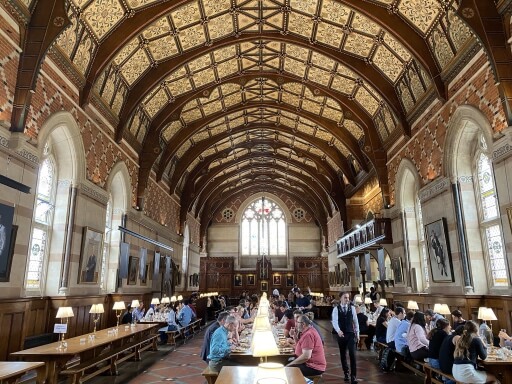 On August 1-3, 2022, the fifth AAAI / ACM Conference on Artificial Intelligence, Ethics, and Society was held at Keble College, Oxford. The full and rich program consisted of five invited talks and dozens of lightning talks.
On August 1-3, 2022, the fifth AAAI / ACM Conference on Artificial Intelligence, Ethics, and Society was held at Keble College, Oxford. The full and rich program consisted of five invited talks and dozens of lightning talks.
The opening invited talk by Deborah Raji, “From Algorithmic Audits to Actual Accountability,” provided an excellent start to the conference. Raji surveyed the challenges and opportunities with AI audits, showing how they can be used to reform—or lead to the retraction of—harmful algorithms. Raji pointed towards a trend of focusing on people behind and impacted by AI systems, marking an encouraging shift from rational to relational concerns.
The next invited talk was from Ronald Arkin, who started working with robots before they could cross the laboratory and became interested in ethics as he saw robots escape the lab. In “Robots that Need to Mislead,” Arkin emphasized the importance of engaging in challenging discussion about designing undesirable but sometimes necessary technologies. These discussions can lead to importance consensus such as that found in IEEE’s deception guidelines.
In the third invited talk, “The AI Mirror,” Shannon Vallor explored how AI as a mirror reveals and conceals. AI can reveal potentially meaningful patterns about behaviors, relationships, and categories. But there are many significant things AI does not reflect: the reflections, desires, and intentions behind our actions; our imagination about and hopes for the future; our introspective searches for meaning and morality; and our ability to realize “anti-patterns.”
Bertram Malle, in the fourth invited talk “Beyond Fairness and Explanation,” pointed to the need to translate values such as fairness into concrete and community-specific norms. These norms can provide justifiable explanations for building trust in artificial agents.
In the final invited talk, “RoboTruckers” Karen Levy discussed the double technological threat to truckers: surveillance and automation. Levy explained how the automation that is happening is more of a slope than a cliff: instead of a sudden hand-off or division of human and machine labor, there is a process of integration following a pattern of hybridization.

The lightning talks covered a number of ethical issues and case studies related to bias, fairness, and transparency. They showed both productive and destructive uses of AI, and included critiques and constructive approaches to AI and ethics. The final set of lightning talks highlighted student PhD projects, reflecting the broad range and global nature of current discussions about AI, ethics, and society. I was encouraged to see doctoral projects focusing on AI in such specific domains as public libraries and schools.
Overall, the conference was very stimulating and encouraging. It was a joy to see so many smart people, from multiple disciplines and at various stages in their careers, working in such an important area. Vallor mentioned theology as a relevant discipline and asserted that spiritual matters are at stake in the discussions and development of AI. But I do not believe any theologians were present at the conference—or religious studies scholars (some of whom recently offered interesting commentary about the religious dimension of the claim that “LaMDa” was sentient). This conference surfaced a number of areas where people of faith can make contributions: addressing AI myths (or misplaced faith in functional assumptions); concerns about malevolence (intentional and unintentional); hopes for beneficial AI (or, to use theological language, how AI might be a means of grace); and the actual as well as appropriate limits of AI (the priority and place of humans values and agency).


